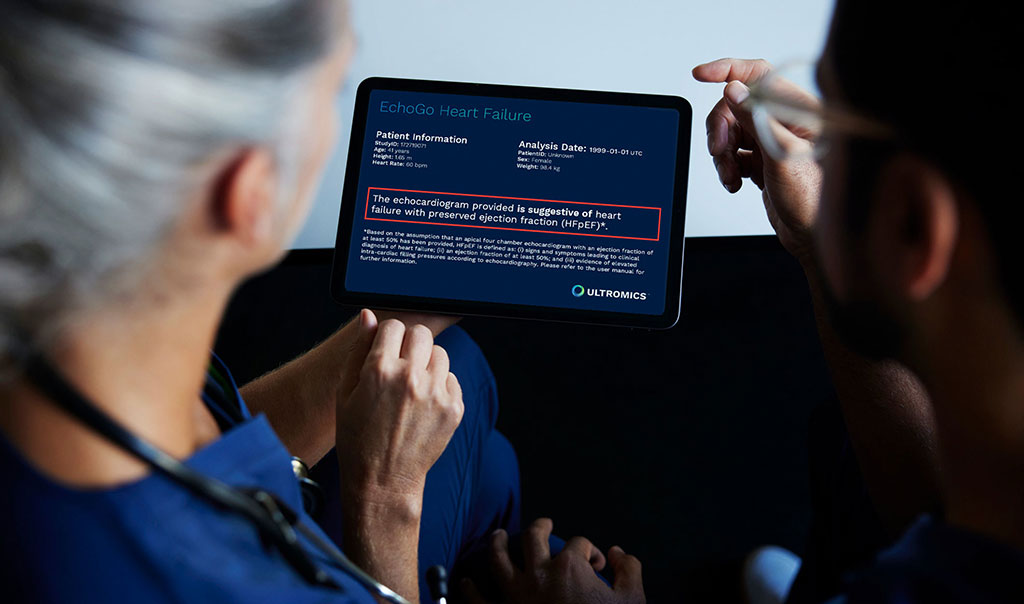AI Solution for Echocardiography to Revolutionize Diagnosis of Heart Failure with Preserved Ejection Fraction
|
By HospiMedica International staff writers Posted on 07 Dec 2022 |

Heart failure with preserved ejection fraction (HFpEF) is a type of heart failure often associated with co-morbidities and tends to be caused by increased pressure within the chambers of the heart. The ejection fraction, or the volume of blood ejected from the left ventricle at each heartbeat, however, remains in normal ranges. This makes it exceedingly difficult to detect using traditional diagnostics, which can miss up to 75% of cases. HFpEF accounts for 50% of the 64 million cases of heart failure worldwide and has overtaken heart failure with reduced ejection fraction (HFrEF) as the most prevalent form of the deadly disease. Current approaches include time-consuming and often inconclusive diastolic function assessment, and require a highly specialized, increasingly rare skillset, and often invasive testing. There is an urgent need to develop predictive tools to help diagnose HFpEF patients. Now, an AI solution for echocardiography has the potential to revolutionize the diagnosis of HFpEF.
EchoGo Heart Failure, a clinical and technological breakthrough, was developed by echocardiography and AI experts from Ultromics (Oxford, UK), in collaboration with Mayo Clinic (Rochester, MN, USA). The device analyzes millions of pixels within a single echocardiogram to deliver precision detection of HFpEF, marking a huge leap forward from traditional diagnostic algorithms for HFpEF. EchoGo Heart Failure aims to prevent HF hospitalizations and reduce mortality through better detection of HFpEF.
EchoGo Heart Failure has received US Food and Drug Administration (FDA) clearance. The platform is the first HFpEF detection algorithm that will help support diagnosis and patient selection for therapy, ultimately improving quality of life and reducing the significant burden HFpEF has on healthcare. Patients can now benefit from new therapy drugs, such as SGLT2is, which has been shown to significantly reduce both hospitalizations and potentially fatal adverse events. The simultaneous clearances of EchoGo Heart Failure to improve HFpEF detection and SGLT2 to improve treatment, represents a giant leap forward in addressing the biggest unmet need in cardiovascular medicine.
"We are delighted that the FDA has recognized EchoGo Heart Failure as a breakthrough device and has cleared the technology to provide reliable detection of HFpEF," said Dr. Ross Upton, CEO and Founder of Ultromics. "The technology improves the accuracy of HFpEF detection, enabling more patients to receive treatment which will reduce the significant burden on patients and healthcare systems alike."
"It has been a pleasure to collaborate with the team at Ultromics to develop and test EchoGo Heart Failure," said Patricia A. Pellikka, MD, Vice Chair, Department of Cardiovascular Medicine at Mayo Clinic. "This novel solution applies AI to cardiovascular imaging to greatly simplify identification of patients with HFpEF, a diagnosis that can be challenging to make, and allow more expeditious treatment. HFpEF currently is associated with high rates of hospitalization and mortality. By facilitating early diagnosis and treatment, we can improve the lives of many."
Related Links:
Ultromics
Mayo Clinic
Latest Critical Care News
- 'Universal' Kidney to Match Any Blood Type
- Light-Based Technology to Measure Brain Blood Flow Could Diagnose Stroke and TBI
- AI Heart Attack Risk Assessment Tool Outperforms Existing Methods
- Smartphone Imaging System Enables Early Oral Cancer Detection
- Swallowable Pill-Sized Bioprinter Treats GI Tract Injuries

- Personalized Brain “Pacemakers” Could Help Patients with Hard-To-Treat Epilepsy
- Microscopic DNA Flower Robots to Enable Precision Medicine Delivery
- Origami Robots to Deliver Medicine Less Invasively and More Effectively
- Improved Cough-Detection Technology Aids Health Monitoring
- AI Identifies Children in ER Likely to Develop Sepsis Within 48 Hours
- New Radiofrequency Therapy Slows Glioblastoma Growth
- Battery-Free Wireless Multi-Sensing Platform Revolutionizes Pressure Injury Detection
- Multimodal AI to Revolutionize Cardiovascular Disease Diagnosis and Treatment
- AI System Reveals Hidden Diagnostic Patterns in Electronic Health Records
- Highly Sensitive On-Skin Sensing Monitor Detects Vitamin B6 and Glucose in Sweat
- Artificial Intelligence Revolutionizing Pediatric Anesthesia Management
Channels
Critical Care
view channel
Light-Based Technology to Measure Brain Blood Flow Could Diagnose Stroke and TBI
Monitoring blood flow in the brain is crucial for diagnosing and treating neurological conditions such as stroke, traumatic brain injury (TBI), and vascular dementia. However, current imaging methods like... Read more
AI Heart Attack Risk Assessment Tool Outperforms Existing Methods
For decades, doctors have relied on standardized scoring systems to assess patients with the most common type of heart attack—non-ST-elevation acute coronary syndrome (NSTE-ACS). The GRACE score, used... Read moreSurgical Techniques
view channel
Minimally Invasive Endoscopic Surgery Improves Severe Stroke Outcomes
Intracerebral hemorrhage, a type of stroke caused by bleeding deep within the brain, remains one of the most challenging neurological emergencies to treat. Accounting for about 15% of all strokes, it carries... Read more
Novel Glue Prevents Complications After Breast Cancer Surgery
Seroma and prolonged lymphorrhea are among the most common complications following axillary lymphadenectomy in breast cancer patients. These postoperative issues can delay recovery and postpone the start... Read morePatient Care
view channel
Revolutionary Automatic IV-Line Flushing Device to Enhance Infusion Care
More than 80% of in-hospital patients receive intravenous (IV) therapy. Every dose of IV medicine delivered in a small volume (<250 mL) infusion bag should be followed by subsequent flushing to ensure... Read more
VR Training Tool Combats Contamination of Portable Medical Equipment
Healthcare-associated infections (HAIs) impact one in every 31 patients, cause nearly 100,000 deaths each year, and cost USD 28.4 billion in direct medical expenses. Notably, up to 75% of these infections... Read more
Portable Biosensor Platform to Reduce Hospital-Acquired Infections
Approximately 4 million patients in the European Union acquire healthcare-associated infections (HAIs) or nosocomial infections each year, with around 37,000 deaths directly resulting from these infections,... Read moreFirst-Of-Its-Kind Portable Germicidal Light Technology Disinfects High-Touch Clinical Surfaces in Seconds
Reducing healthcare-acquired infections (HAIs) remains a pressing issue within global healthcare systems. In the United States alone, 1.7 million patients contract HAIs annually, leading to approximately... Read moreHealth IT
view channel
Printable Molecule-Selective Nanoparticles Enable Mass Production of Wearable Biosensors
The future of medicine is likely to focus on the personalization of healthcare—understanding exactly what an individual requires and delivering the appropriate combination of nutrients, metabolites, and... Read moreBusiness
view channel
Philips and Masimo Partner to Advance Patient Monitoring Measurement Technologies
Royal Philips (Amsterdam, Netherlands) and Masimo (Irvine, California, USA) have renewed their multi-year strategic collaboration, combining Philips’ expertise in patient monitoring with Masimo’s noninvasive... Read more
B. Braun Acquires Digital Microsurgery Company True Digital Surgery
The high-end microsurgery market in neurosurgery, spine, and ENT is undergoing a significant transformation. Traditional analog microscopes are giving way to digital exoscopes, which provide improved visualization,... Read more
CMEF 2025 to Promote Holistic and High-Quality Development of Medical and Health Industry
The 92nd China International Medical Equipment Fair (CMEF 2025) Autumn Exhibition is scheduled to be held from September 26 to 29 at the China Import and Export Fair Complex (Canton Fair Complex) in Guangzhou.... Read more
















